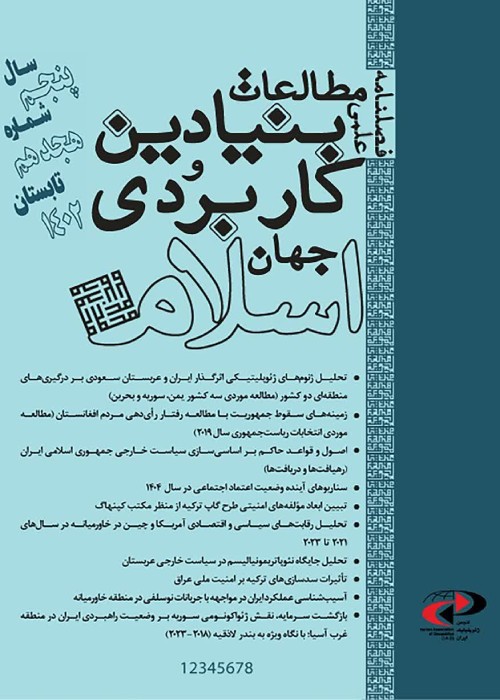The Impact of ISIS's Emergence on the Economic Situation of the Levant Countries (Case Study: Israel)
In the Geopolitical region of the Middle East, the ISIS terrorist group, which emerged as the most powerful organized group, produced a number of political-economic equations for the region and the world order. The emergence of this organized terrorist group had different effects on the economic situation of the Levant countries. As we have seen since 2014, with the emergence of the terrorist group ISIS and their horrific acts of war in Iraq and Syria in particular, and in other countries in the region with bombings, it caused some disorders and security challenges and, consequently, economic costs. It created a lot of policies for these countries and caused countries like Iran to spend part of their national revenues on this issue to confront and fight it and other countries to strengthen it. however, what is remarkable is that ISIL's actions in Israel, despite being in Syria's neighborhood, did not cause an abnormal situation and loss for the country in the political, economic and military fields. It is noteworthy that ISIL terrorist attacks were carried out on the territory of Western European countries, but how can challenges not be carried out in Israel, which is adjacent to ISIL, at least in the form of bombings?
This article has been done with a descriptive-analytical research method and used library resources and internet sites and with an approach to game theory (bargaining). Because the article emphasizes fossil fuels and their role in the Israeli economy, the bargaining approach has been chosen in the theory of bases.
In game theory, balance is such that they are referred to as more or less or the minimum maximum. This means that every actor tries to minimize his defeat. The essence of game theory introduces man as a rational being. Inevitably, calculated human behavior occurs. What is considered as rational behavior in this theory is to maximize achievements. In this theory, methods are studied in which strategic interactions between economic agents result in the superiority (or exploitation) of these agents, where the results in question are probably not considered by any of the agents. However, the rise of ISIS has created economic problems in the Middle East. According to some experts, ISIL's view of oil as a source of finance and economic leverage has escalated clashes with other armed groups, which in turn has fueled economic insecurity in the region. It often sold oil at 50% below the market price, which had many implications for oil-dependent economy countries in the region. The smuggling of oil by ISIL through its own channels has caused further insecurity in the region. It steals large amounts of oil from storage tanks, pipelines and pumping stations. In addition, the movements of ISIS and other hostile groups in Syria reduced the country's oil production from 400,000 barrels before the unrest to 30,000 to 40,000 per day. Several reports claim that ISIL earned $ 3 million a day from Syrian oil operations. However, some other reports put the figure at several hundred thousand dollars a day. According to Christopher Garver, a spokesman for Operation Tidal View, ISIL previously earned about $ 30 million a month from its oil operations, but revenues fell to about $ 15 million a month in early 2016. On July 27, 2016, the United States, along with its coalition partners, reportedly carried out 14,000 airstrikes against ISIS oil operations.However, the countries that make up the Levant have similar linguistic, cultural, and religious characteristics. These countries include Iraq, Syria, Lebanon, Cyprus, Turkey (Hatay Province), Israel, Jordan and the Palestinian Authority. Regarding the geo-economics importance of the Levant Basin, the gas and oil reservoirs of this region should be emphasized. Of the 11 gas fields that have been discovered so far in the Levant sedimentary basin, nine, and the largest, the Leviathan field, are in Israeli waters. At present, about 99% of Israel's energy needs come from fossil fuels. In 2015, the composition of these fuels was 43% oil, 30% natural gas and 26% coal. The country imported all of its fuel needs by 2005 and was in fact, about 100% dependent on imports for energy.
Given that energy plays a decisive role in global equations and supra-regional powers in the Middle East seek to play a decisive role in this region, so energy tools can be considered an important tool for them. They are also looking forward to using the potential of conflict in this direction. The need for extra-regional energy in the Middle East, by supporting ISIS, has paved the way for the weakening of energy-rich countries, including Iraq and Syria, and created the conditions for their energy dominance. Therefore, it seems that this was the best opportunity for Israel to strengthen its economic indicators by earning income and selling energy resources. This acquisition and sale of energy resources was analyzed with an approach of bargaining theory in game theory, and it was observed that the interests of the allies in the regional dimension enabled Israel to better organize its economic situation in the energy sector than before. Looking at the exchanges of energy by Israel in the years of the rise of ISIS, we see that the terrorist group has not created any challenges for the Israeli energy economy.
ISIS , Israel , Economy , Energy , Levant Countries
- حق عضویت دریافتی صرف حمایت از نشریات عضو و نگهداری، تکمیل و توسعه مگیران میشود.
- پرداخت حق اشتراک و دانلود مقالات اجازه بازنشر آن در سایر رسانههای چاپی و دیجیتال را به کاربر نمیدهد.


